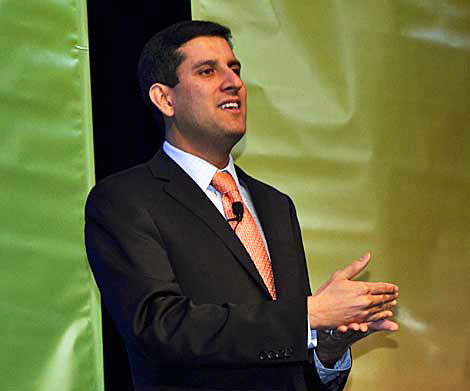
Vivek Kundra, former federal CIO, spoke about a number of achievements during his service in the government, including the Cloud First initiative and not only seeking cost savings but also improving service delivery. (Photo: Colleen Miller)
LAS VEGAS - The information revolution is changing our society and economy, according to former federal CIO Vivek Kundra. And data center managers are on the front lines of that revolution.
"The work you do on a daily basis will have a huge impact on IT," Kundra said Tuesday in his keynote address at the AFCOM Data Center World conference. "This becomes a game changer. Data is the new currency. Data centers represent the digital fuel powering our economy."
Kundra, who in 2009 became the first federal CIO, left the government last year and is now a cloud computing executive at Salesforce.com. But his work in Washington shook up the world of government IT, which accounts for $80 billion in annual spending and spans 12,000 systems. One of Kundra's key initiatives was a massive data center consolidation that is expected to close more than 1,200 data centers by 2015, with their workloads shifted to more efficient data centers or cloud computing platforms.
27 Percent Utilization
"The average utilization of that government infrastructure was below 27 percent," said Kundra. "You had 72 percent of the government's IT capacity doing nothing for the American people."
When Kundra announced a "cloud first" policy to shift many government services to a cloud computing delivery model, there was widespread skepticism that government agencies would be able to respond effectively. Kundra said this pessimism is based on misunderstandings about the government's ability to work with third-party providers.
"There was this view that government couldn't move services (to third-party data centers)," Kundra said. "We did an analysis, and found that 4,700-plus systems were already out of the hands of government. When you look at 'cloud' versus 'not cloud,' what's the distinction?"
Not all the skepticism was external, though.
"The government had this view that it had to own and control everything," said Kundra. "One of the assets I brought was a beginner's mind. I hadn't worked in government for 30 years.
"Not everything had to be in a data center that the government owned and operated," he added."Even more important than the savings was the service delivery. It can now takes days and weeks rather than years to deploy government services."
One Agency, 13 Email Systems
Part of letting go of old ways of doing business involves acknowledging that things are busted. An example: Kundra said the Secretary of the Interior couldn't send an email to all his managers because the department's infrastructure was spread across 13 email systems in dozens of data centers. "We need to shift the focus away from managing systems to tapping the ingenuity of some of the brightest minds in government," said Kundra.
Kundra said concerns that cloud providers aren't secure enough to host government services also miss the larger picture.
"In many case, (cloud providers) had far superior talent and were more transparent on security policies," said Kudnra. "There's a war for talent in security, and many agencies can't afford to compete against the private sector."
In addressing a crowd of 1,000 data center managers, Kundra noted the challenges created by the explosion of Internet-capable devices. There arenow 7 billion people in the world, and about 5 billion mobile devices.
"With each mobile device, every person is instrumenting the world," he said. "You're creating all this data that has to be stored somehwere. Your role is going to be fundamental in architecting the infrastructure."





